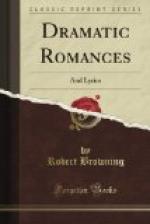Notes: “Porphyria’s Lover”
relates how, by strangling Porphyria with her own
yellow hair, the lover seized and preserved the moment
of perfect love when, pure and good, Porphyria left
the world she could not forego for his sake, and came
to him, for once conquered by her love. A latent
misgiving as to his action is intimated in the closing
line of the poem.
Remarking
upon the fact that Browning removed the
original title, “Madhouse Cells,” which
headed this poem, and “Johannes Agricola in
Meditation,” Mrs. Orr says: “Such
a crime might be committed in a momentary aberration,
or even intense excitement of feeling. It is
characterized here by a matter-of-fact simplicity,
which is its sign of madness. The distinction,
however, is subtle; and we can easily guess why this
and its companion poem did not retain their title.
A madness which is fit for dramatic treatment is
not sufficiently removed from sanity.”
“Childe Roland to the dark tower came.”
(See Edgar’s song in “Lear.”)
I
My first thought was, he lied in every word,
That
hoary cripple, with malicious eye
Askance
to watch the working of his lie
On mine, and mouth scarce able to afford
Suppression of the glee, that pursed and scored
Its
edge, at one more victim gained thereby.
II
What else should he be set for, with his staff?
What,
save to waylay with his lies, ensnare
All
travellers who might find him posted there,
10
And ask the road? I guessed what skull-like laugh
Would break, what crutch ’gin write my epitaph
For
pastime in the dusty thoroughfare,
III
If at his counsel I should turn aside
Into
that ominous tract which, all agree
Hides
the Dark Tower. Yet acquiescingly
I did turn as he pointed: neither pride
Nor hope rekindling at the end descried
So
much as gladness that some end might be.
IV
For, what with my whole world-wide wandering,
What
with my search drawn out thro’ years, my hope
20
Dwindled
into a ghost not fit to cope
With that obstreperous joy success would bring,
I hardly tried now to rebuke the spring
My
heart made, finding failure in its scope.
V
As when a sick man very near to death
Seems
dead indeed, and feels begin and end
The
tears and takes the farewell of each friend,
And hears one bid the other go, draw breath
Freelier outside ("since all is o’er,”
he saith,
“And
the blow fallen no grieving can amend"); 30




